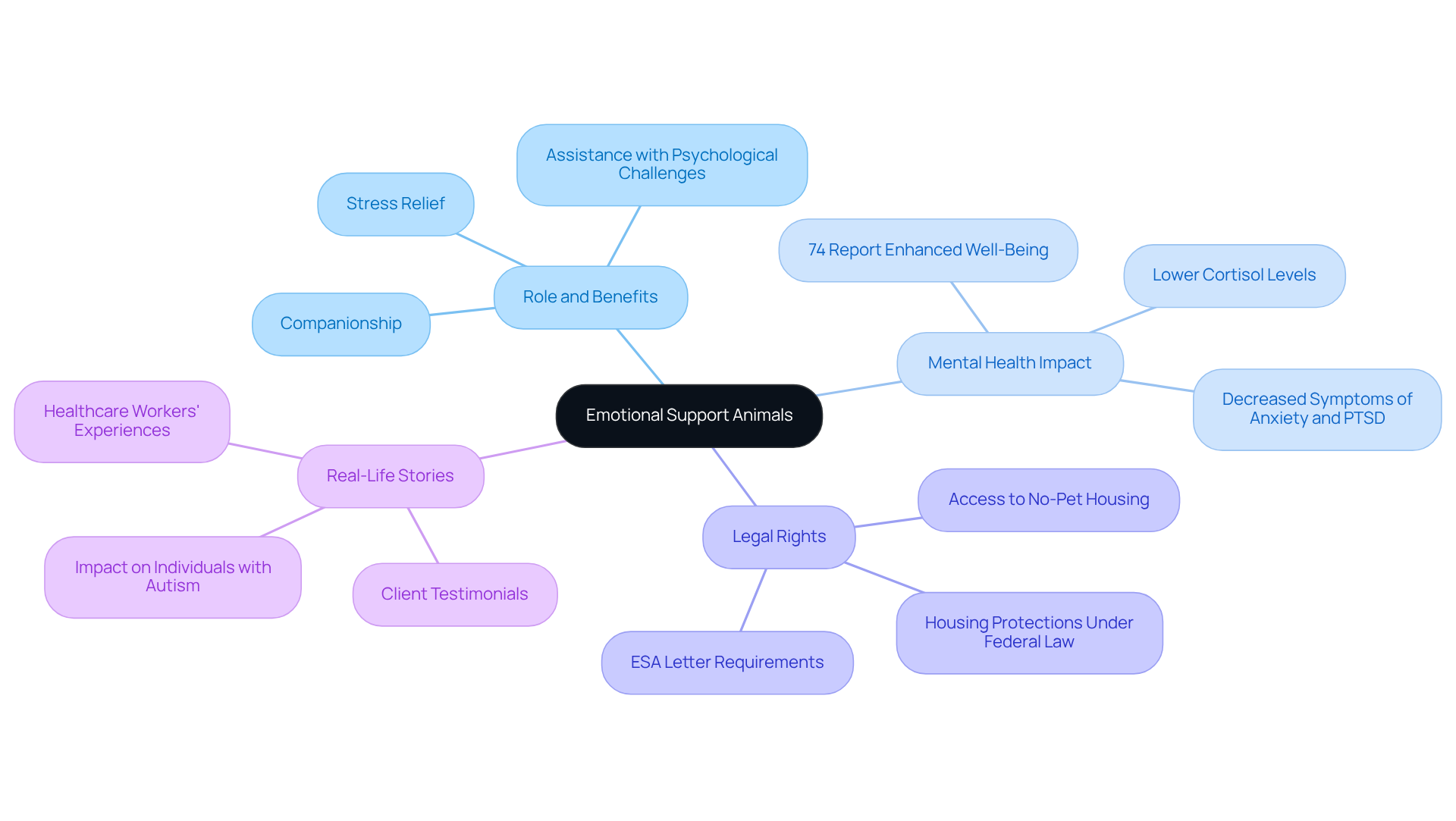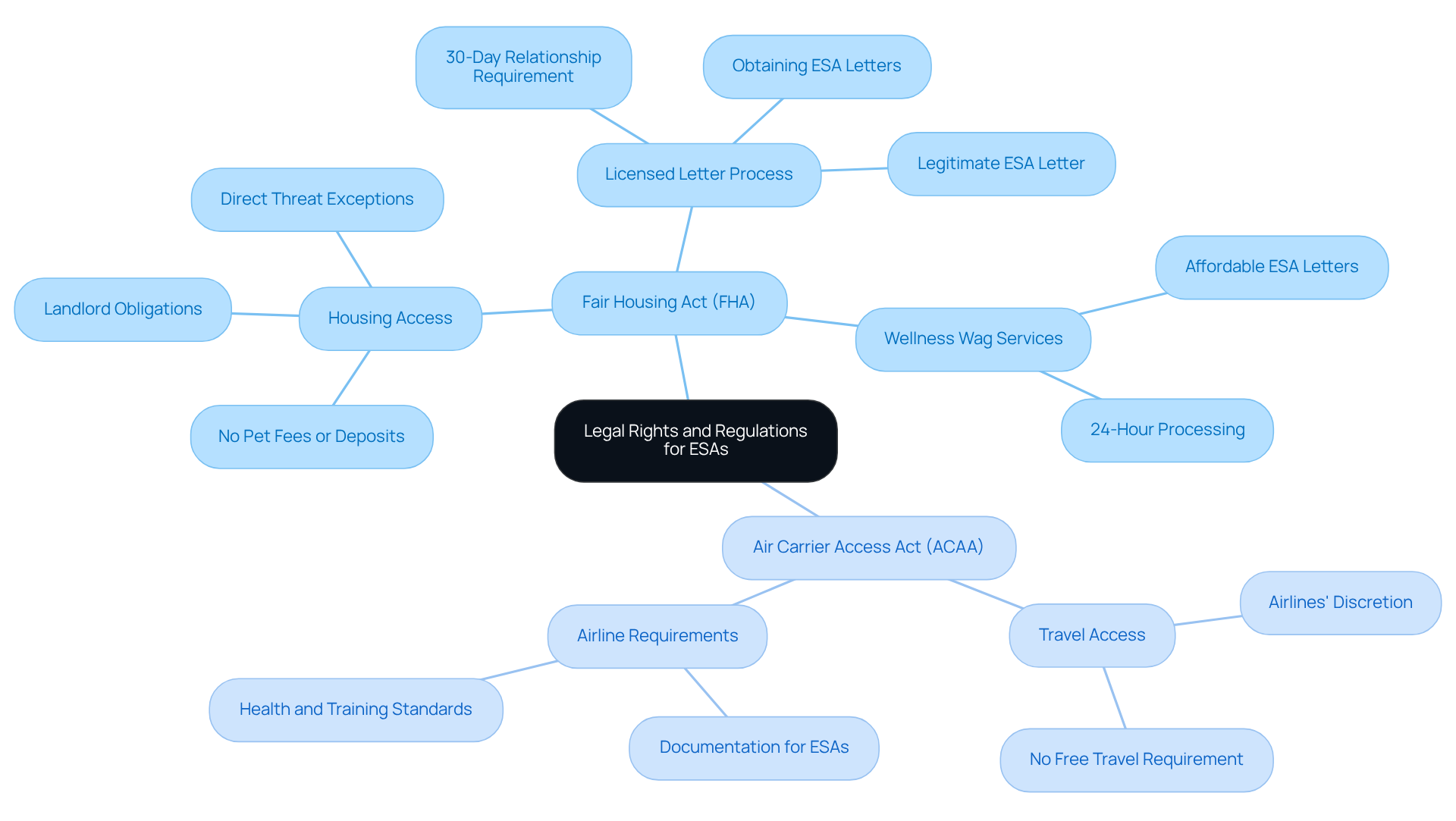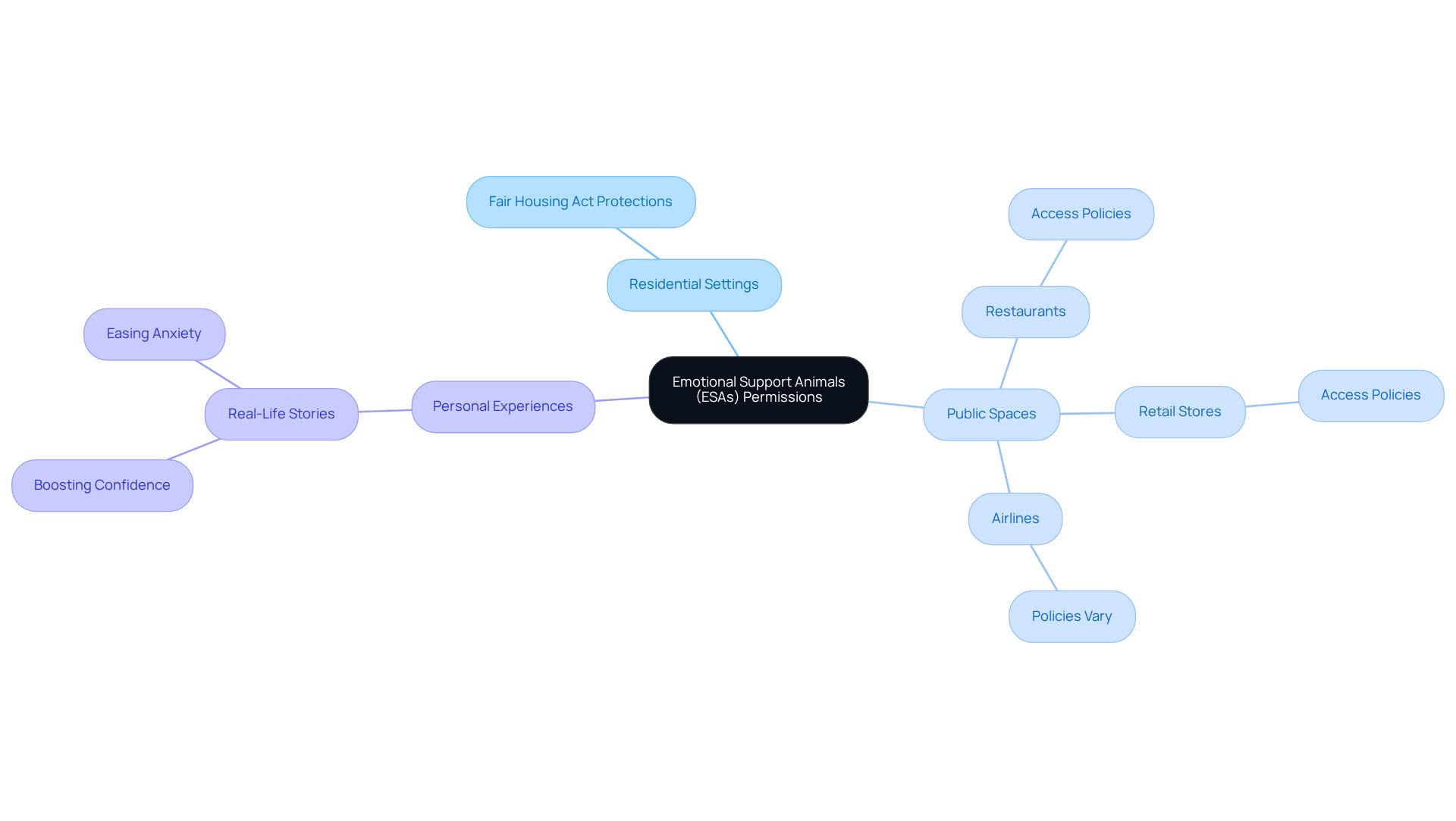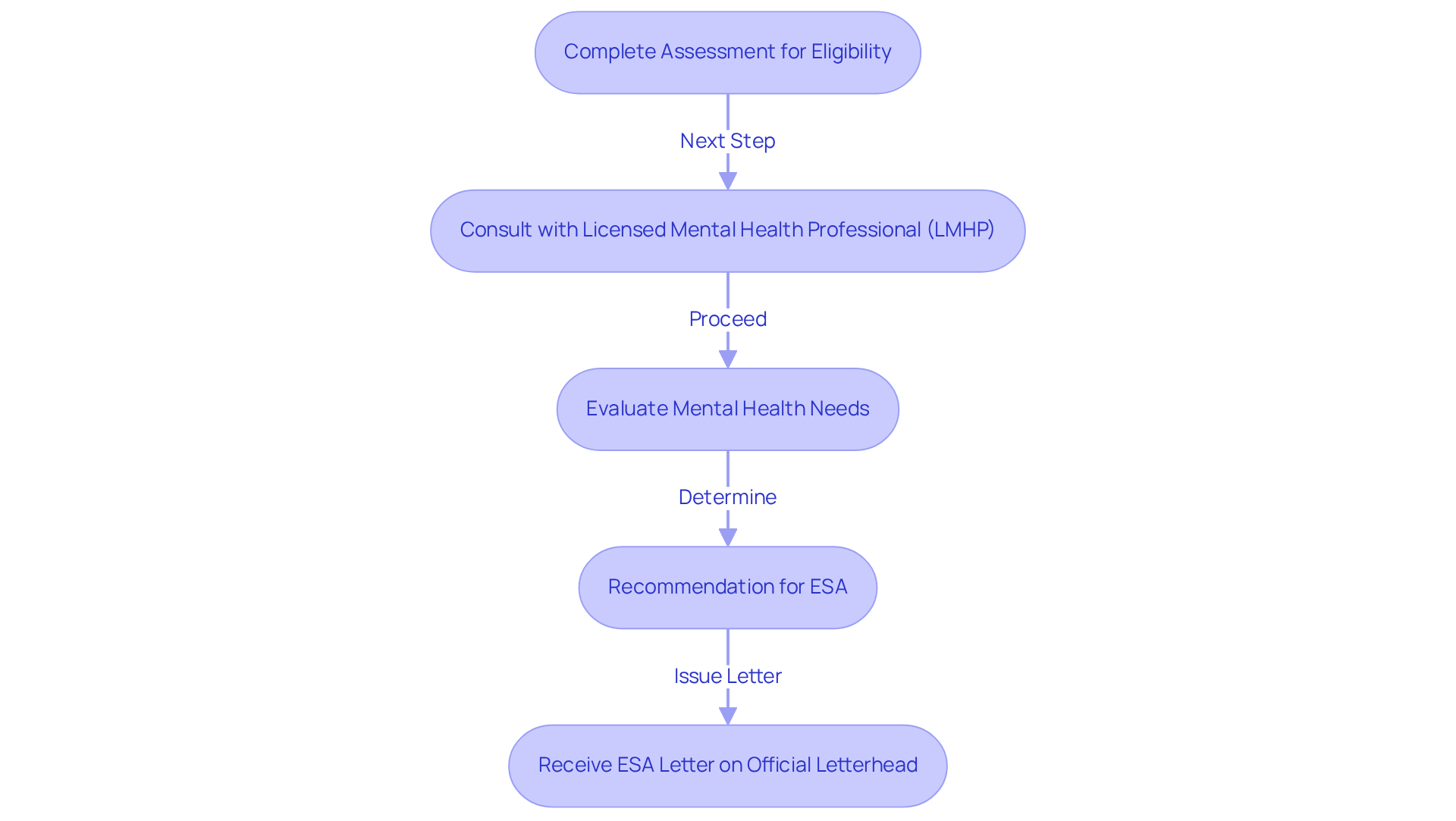

Can Emotional Support Animals Go Anywhere? Know Your Rights and Rules
by Lena Park
Last updated: September 18, 2025
Verified and Approved by:
Angela Morris,
MSW, LCSW
Fact Checked

Overview
Emotional support animals (ESAs) hold specific legal rights that allow them to accompany their owners in certain residential and travel situations. However, it’s important to understand that their access is more limited in public spaces compared to service animals. Many individuals facing mental health challenges may feel overwhelmed by these restrictions. It’s crucial to recognize the emotional impact of such limitations.
While ESAs can live in housing that typically prohibits pets under the Fair Housing Act and travel under the Air Carrier Access Act, their presence in other public venues is often governed by individual business policies. This means that ESA owners must verify access beforehand, which can add to their stress.
Remember, you are not alone in navigating these challenges; there are supportive resources available to help you understand your rights and find comfort in your ESA’s companionship.
Introduction
Understanding the role of emotional support animals (ESAs) is essential in a society where mental health challenges are increasingly recognized. Many individuals grapple with anxiety, depression, and PTSD, and these cherished companions provide vital emotional relief.
However, the legal rights and access to public spaces for ESAs often remain unclear, leaving owners uncertain about their companions’ places in the world. As the question arises—can emotional support animals truly go anywhere?—it becomes crucial for ESA owners to navigate the complexities of regulations that govern their rights.
This journey is not just about rules; it’s about ensuring that individuals can benefit from the companionship of their beloved animals while feeling supported and understood in various establishments.
Define Emotional Support Animals and Their Role
Support Animals serve as cherished companions, providing essential comfort and assistance to those navigating psychological challenges. Unlike service animals, which undergo specific training to perform tasks for individuals with disabilities, these support animals primarily offer companionship and relief from stress. This distinction is vital, as emotional support animals do not require specialized training but must be endorsed by a licensed mental health expert to qualify for legal protections under federal law.
The presence of an Emotional Support Animal (ESA) can profoundly alleviate symptoms of anxiety, depression, and PTSD. Research reveals that engaging with these animals can lead to measurable improvements in mental health; for example, 74% of pet owners report enhanced mental well-being after welcoming a pet into their lives. Additionally, studies indicate that simple interactions with pets can lower cortisol levels, fostering relaxation and emotional stability.
Real-life stories illustrate the significant impact of emotional support animals. Healthcare professionals, often working in high-stress environments, have found that their ESAs help reduce anxiety and improve sleep quality. The companionship of an ESA can create a calming routine, aiding in the management of workplace stress and nurturing mental resilience. As mental health professionals emphasize, the bond between a person and their ESA can be a vital source of support, enhancing overall psychological well-being and providing a sense of stability during challenging times.
Understanding the rights associated with emotional support animals can emotional support animals go anywhere is crucial for individuals seeking to benefit from their companionship. With the appropriate documentation, individuals can live alongside their emotional support animals in places that typically restrict pets, raising the question of where can emotional support animals go anywhere to ensure they receive the emotional assistance essential for their mental well-being. To obtain an ESA letter, individuals must consult with a licensed mental health expert who can assess their needs and provide the necessary documentation to recognize their rights.

Explore Legal Rights and Regulations for ESAs
In the United States, many individuals face emotional challenges that can feel overwhelming. For those struggling with mental health issues, emotional support animals (ESAs) can provide a sense of comfort and companionship. Thankfully, the Fair Housing Act (FHA) and the Air Carrier Access Act (ACAA) offer protections for these essential companions.
The FHA allows individuals with ESAs to live in housing that may otherwise prohibit pets, provided they have a valid letter from a licensed mental health professional. At Wellness Wag, we understand the importance of this support and offer a streamlined process to obtain that letter, making it accessible and affordable with payment plans starting as low as $32.25. Clients can consult with a licensed medical professional who is dedicated to providing expert guidance and care, ensuring that they receive their support animal letter within just 24 hours.
Moreover, the ACAA permits emotional support animals to accompany their owners on flights, although airlines may have specific requirements. Navigating these regulations is essential for ESA owners, as it helps them access housing and travel without facing discrimination.
It’s important to recognize that emotional support animals can go anywhere, but they differ from service dogs; while they provide invaluable emotional comfort, they do not have the same legal rights and access to public areas as service dogs under the ADA. By understanding these distinctions, individuals can better advocate for their needs and the needs of their beloved companions.
Remember, you are not alone on this journey, and support is available to help you every step of the way.

Identify Locations and Situations Where ESAs Are Permitted
Emotional Support Animals (ESAs) provide essential support for individuals facing emotional challenges, and they are granted specific protections under the Fair Housing Act (FHA). This allows them access to residential settings such as apartments and rental homes, which is a crucial lifeline for many. However, the landscape becomes more complex when discussing where can emotional support animals go anywhere in public spaces. Many establishments, including restaurants and retail stores, may restrict access to emotional support animals unless they have a policy that allows for emotional support animals to go anywhere. For instance, while some airlines welcome ESAs, their policies can differ significantly, necessitating prior confirmation before travel.
In public spaces, certain parks and outdoor areas typically allow ESAs, leading to the question of whether emotional support animals can go anywhere, as access to indoor venues often rests with the discretion of the business. It is advisable for ESA owners to reach out in advance to verify specific policies, as some businesses may have particular guidelines regarding support animals.
Real-life experiences shared by ESA owners highlight the importance of understanding these regulations. One owner recounted how their ESA was instrumental in boosting their confidence during social outings, while another expressed that having their ESA present in public significantly eased feelings of anxiety and isolation. These personal stories illustrate the profound impact that ESAs can have on individuals’ emotional well-being.
Recognizing these nuances is vital for ESA owners. It empowers them to navigate their rights and responsibilities effectively, ensuring they can enjoy the companionship of their beloved animals while adhering to the rules established by various establishments. Remember, you are not alone in this journey; support is available to help you and your ESA thrive together.

Outline the Process for Obtaining an ESA Letter
Acquiring a valid ESA letter begins with an important step: completing an assessment to determine eligibility. This process typically involves a compassionate consultation with a licensed mental health professional (LMHP) who will carefully evaluate your mental health needs and the potential benefits of having an emotional support animal (ESA). It is essential for the LMHP to be well-versed in the legal requirements surrounding ESAs, ensuring that the letter includes vital information such as your diagnosis and a heartfelt recommendation for an ESA. The letter must be issued on official letterhead and include the clinician’s contact information, license type, and number.
Once your ESA letter is approved, you can expect to receive it within 24 to 48 hours, though this timeframe may vary depending on the provider and your existing relationship with the mental health professional. For instance, if you have been working with your therapist for some time, the process may be quicker. However, new clients might experience longer wait times, sometimes needing multiple consultations to build the necessary rapport.
Research shows that about 76% of service animal owners report improvements in their daily functioning, underscoring the profound impact ESAs can have on mental health. In recent years, there has been a notable increase in the number of individuals obtaining ESA letters, reflecting a growing recognition of the therapeutic benefits that animal companionship can offer. By ensuring that your ESA letter meets legal standards, you can ease your access to housing and travel accommodations, which highlights the question of where can emotional support animals go anywhere to fully embrace the support they provide.

Conclusion
Emotional Support Animals (ESAs) are vital companions for individuals navigating mental health challenges, offering comfort and companionship during difficult times. It is essential to understand the specific rights and regulations regarding their access, as this knowledge empowers individuals to advocate for their needs. Distinguishing between ESAs and service animals is crucial, shaping the legal landscape of where these beloved companions can accompany their owners.
Throughout this discussion, we highlight the importance of obtaining a valid ESA letter, which involves a thoughtful assessment by a licensed mental health professional. The protections granted by the Fair Housing Act and the Air Carrier Access Act ensure that ESAs can provide support in residential settings and during travel. However, access to public places ultimately remains at the discretion of individual businesses. Real-life experiences illustrate the profound impact of ESAs on mental health, showcasing their remarkable ability to alleviate anxiety and foster a sense of belonging.
Recognizing the rights and responsibilities that come with emotional support animal ownership is vital for navigating daily life. By understanding where emotional support animals can go and the necessary documentation, individuals can advocate effectively for their needs. As the therapeutic benefits of ESAs gain recognition, the importance of informed engagement with these regulations becomes increasingly clear. Embracing this knowledge not only enhances the quality of life for ESA owners but also strengthens the essential bond they share with their beloved companions.
Frequently Asked Questions
What are Emotional Support Animals (ESAs) and what role do they play?
Emotional Support Animals provide companionship and comfort to individuals facing psychological challenges. They help alleviate symptoms of anxiety, depression, and PTSD but do not require specialized training like service animals.
How do Emotional Support Animals differ from service animals?
Unlike service animals, which are trained to perform specific tasks for individuals with disabilities, Emotional Support Animals primarily offer companionship and relief from stress without the need for specialized training.
What are the legal requirements for an animal to be considered an Emotional Support Animal?
To qualify for legal protections under federal law, an Emotional Support Animal must be endorsed by a licensed mental health expert.
What are the benefits of having an Emotional Support Animal?
Engaging with Emotional Support Animals can lead to measurable improvements in mental health, such as reduced symptoms of anxiety and depression. Research shows that 74% of pet owners report enhanced mental well-being after acquiring a pet.
How do Emotional Support Animals affect mental health?
Interactions with Emotional Support Animals can lower cortisol levels, promoting relaxation and emotional stability, which can be particularly beneficial for individuals in high-stress environments.
What rights do individuals have concerning Emotional Support Animals?
With the appropriate documentation, individuals can live with their Emotional Support Animals in places that typically restrict pets, allowing them to receive essential emotional assistance for their mental well-being.
How can someone obtain an ESA letter?
To obtain an ESA letter, individuals must consult with a licensed mental health expert who can assess their needs and provide the necessary documentation to recognize their rights regarding Emotional Support Animals.
Certify Your Emotional Support Animal Today

Why You Can Rely on Us?
At Wellness Wag, we believe your pet deserves care rooted in both science and compassion. Each article is carefully researched, written in clear language for pet owners, and then reviewed by qualified professionals to ensure the information is evidence-based, current, and practical for real-life care. Our goal is to help you feel confident in making informed decisions about your pet’s health and well-being.
Reviewed by
Angela Morris, MSW, LCSW
Angela is a licensed clinical social worker with 20 years of experience in patient advocacy and community mental health. She has assisted numerous clients with ESA evaluations and brings a deep understanding of disability accommodations, ensuring that all information is accurate, supportive, and practical.

Written by :
Lena Park
Last Updated :
September 18, 2025












